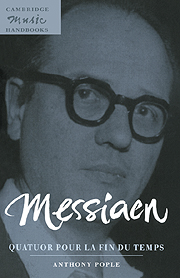Book contents
- Frontmatter
- Contents
- Acknowledgements
- Introduction
- 1 ‘Liturgie de cristal’
- 2 ‘Vocalise, pour l'Ange qui annonce la fin du Temps’
- 3 ‘Abîme des oiseaux’
- 4 ‘Intermède’
- 5 ‘Louange à l'Éternité de Jésus’
- 6 ‘Danse de la fureur, pour les sept trompettes’
- 7 ‘Fouillis d'arcs-en-ciel, pour l'Ange qui annonce la fin du temps’
- 8 ‘Louange à l'Immortalité de Jésus’
- 9 Contexts
- Appendix: Messiaen's modes à transpositions limitées
- Notes
- Select bibliography
- Index
Introduction
Published online by Cambridge University Press: 05 June 2012
- Frontmatter
- Contents
- Acknowledgements
- Introduction
- 1 ‘Liturgie de cristal’
- 2 ‘Vocalise, pour l'Ange qui annonce la fin du Temps’
- 3 ‘Abîme des oiseaux’
- 4 ‘Intermède’
- 5 ‘Louange à l'Éternité de Jésus’
- 6 ‘Danse de la fureur, pour les sept trompettes’
- 7 ‘Fouillis d'arcs-en-ciel, pour l'Ange qui annonce la fin du temps’
- 8 ‘Louange à l'Immortalité de Jésus’
- 9 Contexts
- Appendix: Messiaen's modes à transpositions limitées
- Notes
- Select bibliography
- Index
Summary
In May and June 1940 the German Chancellor Adolf Hitler conducted a remarkable campaign of war which culminated in an Armistice treaty signed with the French government of Marshal Pétain in a railway carriage north-east of Paris on 22 June. The military thrust which led to this notorious but pragmatic political settlement had begun at dawn on 10 May with an invasion of the Netherlands and Belgium. By the end of the month both countries had fallen; British troops had fled to the coast in their thousands and were being evacuated from Dunkirk by a vast flotilla of boats large and small. At the same time, several hundred miles to the east, many French troops were taken prisoner as the German armies moved relentlessly onward from the Belgian border.
One of these was the young composer and organist Olivier Messiaen. He was thirty-one years of age, round-faced and bespectacled, and was serving in a menial capacity for the medical corps. Messiaen and three companions were captured in a forest by German troops as they reached the end of a journey by foot from Verdun to Nancy. Together with countless others he was held in an open-air camp pending transit from the war zone to the heart of Hitler's empire, and after a long and arduous journey by rail arrived at a prisoner-of-war camp known as Stalag VIIIA, at Görlitz, a small town in Silesia about 55 miles east of Dresden.
- Type
- Chapter
- Information
- Messiaen: Quatuor pour la fin du temps , pp. 1 - 16Publisher: Cambridge University PressPrint publication year: 1998



